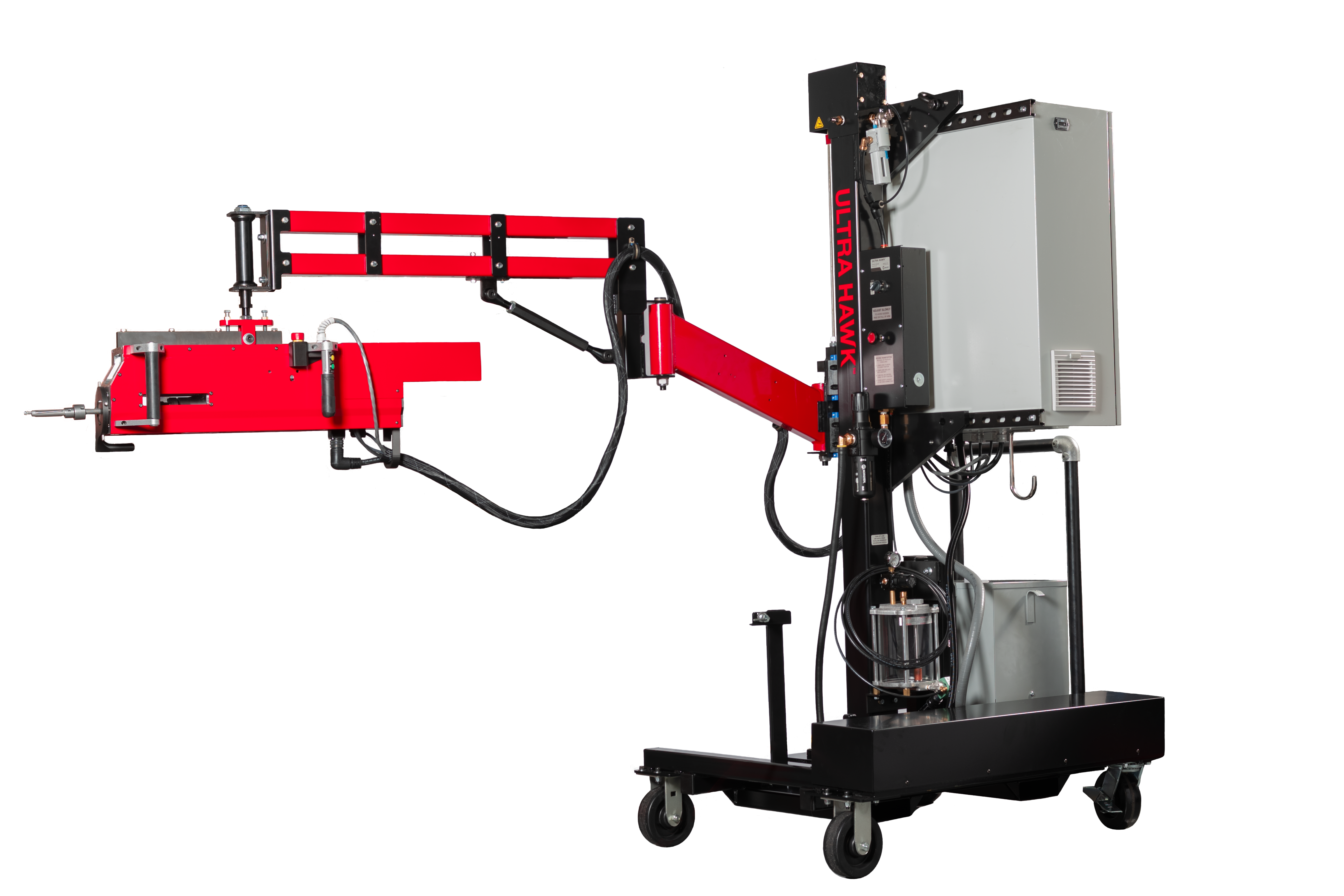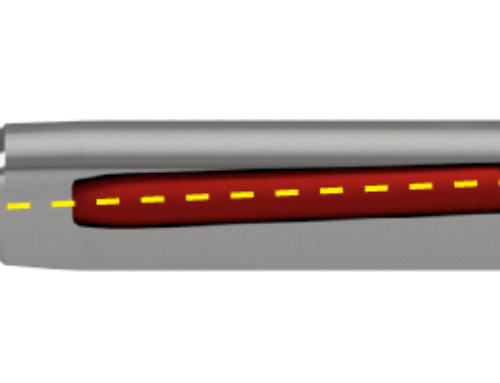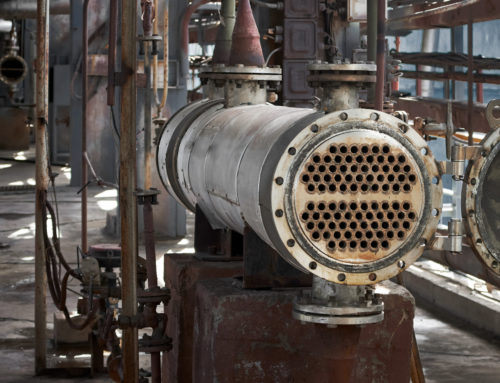Fabrication Company Reduces Expansion Cycle Times by 80% With Parallel Pin Expansion
Quick Summary
The Challenge
- Current rolling motors were not providing a consistent and repeatable approach to tube expansion
- Overheating required frequent tool changes, resulting in downtime
- Manual tool lubrication for large jobs can extend job duration
- Heavy handheld motors cause downtime due to operator fatigue and pose safety concerns
The Solution
- Ultra Hawk’s speed and productivity of an electric servo motor plus its parallel pin and traditional expansion capabilities
- Production trials to determine joint consistency, cycle times, and operator ergonomic improvements.
The Results
- Cycle time savings of 80% per tube, from 22 seconds to 4 seconds
- Through-the-cage auto-lubrication increased tool life 3:1 compared to using an 850 Rolling Motor
- Zero tube leaks due to the system, reducing the number of man-hours attributed to re-rolling
- Increased ergonomics provide a safer rolling method and reduced operator fatigue
The Challenge
Dunn Heat Exchangers, Inc., a fabrication company located in Texas City, Texas, offers heat exchanger cleaning, decontamination, repair, and fabrication services in the highly competitive shell and tube market. Offering services 24 hours a day, seven days a week, means that productivity and efficiency are key to offering the fastest turnaround time to customers.
One of the main challenges facing the team was the amount of time it took to complete a job. Using an 850-style push-pull motor with a traditional expander, it was easy to add days onto a job due to lower tool life, operator fatigue, and downtime.
Downtime and longer expansion cycle times were largely due to frequent tooling change outs. Relying on a manual tool lubrication process, the operator would need to lubricate each tube prior to starting a job. However, this process was often not enough to prevent early wear and overheating of tools, resulting in extra downtime to change tooling.
Operator fatigue and safety was also a concern for the Dunn team. Holding a handheld motor requires the operator to support about 14 lbs. or more, while absorbing about 12 ft lbs. of torque during each tube expansion. “When doing tapered pin expansion, if the tool slipped from your hands after catching the ID of the tube, I have little doubt it could break someone’s arm,” said Pete Dunn Jr, President. Over a few thousand expansions, fatigue can take over causing a slow down in productivity and increase safety concerns for operators.
With a desire to increase cycle times, acquire more jobs, and improve operator safety, the team at Dunn Heat Exchanger decided to collaborate with Elliott Tool Technologies to find a better solution.
The Solution
Elliott’s new, truly complete rolling system, the Ultra Hawk, offers the speed and productivity of an electric servo motor with the capability to perform parallel pin and traditional expansion. Productivity is maximized through best-in-class cycle times and the need for rework is lowered by providing consistent, reliable expansion.
With the Ultra Hawk’s parallel pin feature, you can see up to 2Xs the speed on cycle times. Parallel pin rolling also helps to reduce the force exerted against the tube and tube sheet, eliminating costly tube sheet damage and warping.
This system ensures every tube is rolled to spec through a measurement of torque and controls system functions which allows tubes to be rolled to the target wall reduction each time to eliminate costly re-rolling. Data output ensures customers that quality control metrics and customer requirements are met, and that the vessel will pass hydro.
After trialing the Ultra Hawk assisted rolling system, Dunn Heat Exchanger decided that the productivity and consistency of the system were exactly what they were looking for. Additionally, the ergonomics and easy set-up made the Ultra Hawk their desired method for tube expansion moving forward, as it didn’t require any extensive training or experience to operate.
“With the speed increase of the new machine, I don’t really see a reason to use tapered pin expansion on new fabrication anymore.”
The Results
During a large job, Dunn expanded 1,889 SA179 ¾” x 14 BWG tubes to conduct a comparison test between traditional rolling with an 850-style motor and parallel pin rolling with the Ultra Hawk system. Dunn realized the benefits the Ultra Hawk offers almost immediately. An 850 motor was used to roll 300 tubes with traditional expansion, at a 22 second cycle time, using one operator. The Ultra Hawk was used to roll 1,589 tubes, parallel pin expansion, at a four second cycle time, with one operator.
Dunn saw productivity increases not only in cycle times but also in tool life, with a 3:1 increase using the Ultra Hawk, versus a handheld motor with traditional rolling. Expansion consistency also increased with parallel pin, and the Ultra Hawk’s ability to measure torque resulted in no leaks at hydro. This is compared to the one leak of the 300 tubes rolled with traditional expansion using the 850 motor.
The ergonomics and safety of the system also had a positive impact on operators. “The torque of a push\pull certainly contributes to operator fatigue, but they can also be dangerous. Other designs on the market have a mounted roll motor located behind the operator with a rotating shaft that passes underneath the operator’s arm. As you can imagine that shaft has the possibility of causing a major injury should someone’s clothing or skin get caught,” said Pete Dunn Jr. The pneumatic arm of the Ultra Hawk absorbs the weight and torque of the motor, reducing the risk of injury and fatigue on the job.
Overall, the Ultra Hawk system has helped Dunn realize the benefits of parallel pin expansion and how the system can provide a consistent and repeatable approach to tube expansion. As Pete Dunn Jr. explains, “with the speed increase of the new machine, I don’t really see a reason to use tapered pin expansion on new fabrication anymore.”






